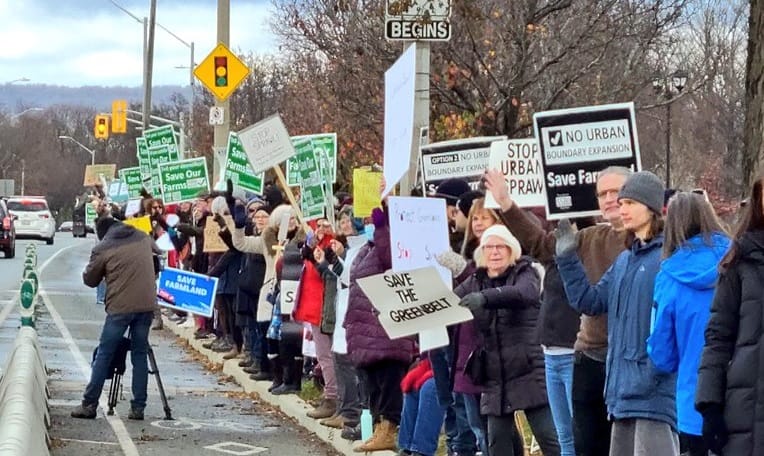Hundreds in Hamilton march against Ford’s ‘wrecking ball’ Bill 23
Published November 14, 2022 at 12:48 pm

Evidently, Hamiltonians who live in one of the most extreme heat-vulnerable areas of Canada believe that biodiversity and regional food security might be a useful tool for climate adaptation.
The Premier Doug Ford-led PC Party of Ontario (PCPO) government, at a closed event one day after the Oct. 24 municipal election, announced the forthcoming Bill 23, or More Homes Built Faster act. Public consultation on the 175-page bill, which would amend 10 provincial acts and enable breaking apart wetland complexes while also banning municipal green building standards, ends on Thursday night (Nov. 17, 7 p.m.). But on Sunday, an estimated 400 people from Hamilton and Halton gathered at Dundurn National Historic Site and and lined York Blvd. to protest against both the bill and the recent elimination of a “firm urban boundary” from the City of Hamilton’s official plan.
Some members of Hamilton city council, which will be seated this week, attended the rally. Incoming Ward 12 Coun. Craig Cassar, who is cofounder of the Save Our Streams Hamilton wetlands protection coalition, described Bill 23 in no uncertain terms.
“Bill 23 is a wrecking ball,” Cassar wrote in a social media post. “It will destroy our wetlands and shackle our ability to build affordable housing.”
Ward 8 Coun. John-Paul Danko tagged the premier in a post (he did not get a response). Danko reiterated that, over the last 1½ years of its term, the former council created a firm urban boundary (which was nixed 10 days ago by the province) and made a skein of zoning changes that will allow for taking advantage of underused space for infill development.
“(Hamilton) is united — rural, suburban & urban residents together: no to paving farmland, no to destroying the greenbelt — yes to responsible growth within the urban boundary,” Danko wrote. “Will you (Ford) listen to the people?”
Repeated messages from inthehammer to Ford’s two Hamilton-area MPPs, Tourism, Culture and Sport Minister Neil Lumsden (Hamilton East—Stoney Creek) and Donna Skelly (Flamborough—Glanbrook) about when they will meet with constituents regarding Bill 23 have not received a response.
In 2018, the PCPO’s campaign slogan was, “For the people.” Ford also said four years ago that his government would not touch the Greenbelt, saying “the people had spoken” on that front. The agriculturally and environmentally sensitive lands have been protected since laws were passed in 2005 under a Dalton McGuinty-led Ontario Liberal government.
Ontario, by any account, is short of affordable housing. But the Greenbelt protects the Greater Golden Horseshoe’s $35-billion farming and food processing industry, which makes Southern Ontario the third-largest agricultural producer in North America after California and Chicago.
Climate justice groups, ecologists, municipal leaders in other Southern Ontario communities and representatives of the Ontario Federation of Agriculture have spoken out against Bill 23.
Did my best to capture the 100s of people lined up along York Blvd today – all united in their message to the Ford Government – Hands off the Greenbelt! Bill 23 stinks! Let Hamilton & Halton move ahead with their progressive urban growth mgmt plans!! #ClimateEmergency pic.twitter.com/elCsCnQSVT
— Lynda Lukasik (@lyndalukasik) November 13, 2022
Criticism has included:
- Ecologist Nick Stow explained that, as written, Bill 23 would render the Ontario Wetlands Evaluation System essentially toothless. He contended that any public oversight over whether a wetland should be paved over will evaporate.”The wetland evaluator will only be accountable for the objectivity and accuracy of the wetland evaluation to the person paying for it,” Stow wrote on Friday (Nov. 11).”I’ll say that again, because it’s hard to believe: the property owner or developer seeking to remove the significant wetland designation will be the only authority determining if the wetland evaluation is valid.
- Burlington Mayor Marianne Meed Ward described Bill 23 as “an erosion of local democracy and planning authority… This is a step in devastating the farmland we need to feed our growing community.”
- York Regional Council has passed a motion requesting the province halt Bill 23. The council wants the bill paused “to allow for more fulsome analysis and meaningful consultation and collaboration with Ontario’s municipalities.”
- The Ontario Headwaters Institute, a non-profit based in Oakville, has started a petition calling on Ford to withdraw Bill 23 and commit to sustainable planning. It noted that regional biodiversity is a key to protecting food security and growing habitats.
“Watercourses and wetlands are part of the global commons of water,” OHI says on its website. “Because society needs to protect regional biodiversity and food security. And because it is imperative to build sustainable, low-carbon communities in an era of the climate, biodiversity, and food security crises.”
Because climate change leads to more extreme weather patterns, farmers are at greater risk of crop loss, which can lead to smaller harvests and higher prices. Current examples of that effect on Canadians’ grocery bills include lettuce and olives.
Earlier this year, the Intact Centre on Climate Adaptation at the University of Waterloo released a report saying that the Hamilton-Niagara region is more vulnerable to extreme heat — and its effects of human health and affordability — than almost anywhere else in Canada. It ranked second behind Windsor-Essex in southwestern Ontario.
The period to request to participate in the committee, or give input to the province, is open until Thursday at 7 p.m. at ola.org. The Environmental Defence non-profit has also prepared a Google Docs toolkit for helping
Wondering what YOU can DO to respond to Bill 23 – More Homes Built Faster? Submit written comments! Deadline to comment = Nov 17th. Our friends @envirodefence have created a helpful toolkit for preparing comments – see: https://t.co/DYLmNplgAU 1/3
— Environment Hamilton (@EnvHamilton) November 10, 2022
(Cover image: John-Paul Danko / Twitter.)
insauga's Editorial Standards and Policies advertising





